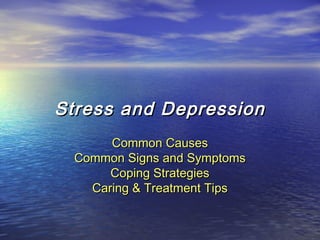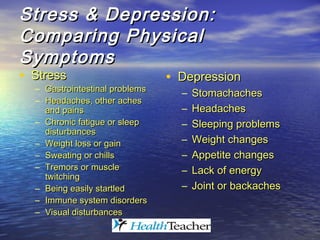Stress and depression
- 1. Stress and Depression Common Causes Common Signs and Symptoms Coping Strategies Caring & Treatment Tips
- 2. What Is Stress? âĒ Stress is the way your body relates to lifeâs pressures.
- 3. What Are Some Common Sources of Stress? âĒ Situations in the home â Parentsâ separation or divorce, â A new stepparent, â A new brother or sister, â A single parent household, â Little or no emotional support, â Neglect (personal needs not met), â Abuse (physical or sexual)âĶ
- 4. What Are Some Common Sources of Stress? âĒ Situations in life: â Death of a loved one or friend, â Moving to a new town or new school, â Illness or hospitalization, â Violence in the neighborhood, community, world, â Natural disasters or other emergenciesâĶ
- 5. What Are Some Common Sources of Stress? âĒ Situations at school: â Problems with friends, â Gangs, threats from others, bullies, â Competition, â Popularity, â Homework, grades, pressures to excel, â No support for school workâĶ
- 6. Reactions to Stress âĒ Reactions to stress âĒ Reactions to stress can be can affect a personâs â Short term â Physical health â Long term â Emotional health â Extreme and life threatening â Thinking â Social activity
- 7. What Are Some Common Symptoms of Stress? âĒ Thoughts: â Difficulty communicating or listening, â Lack of concentration, â Memory problems, â Difficulty making decisions, â Disorientation and confusion, â Loss of objectivityâĶ
- 8. What Are Some Common Symptoms of Stress? âĒ Feelings â Frequent crying, show of emotions, â Hyper-vigilance or excessive worry, â Irritability, outbursts of anger, frequent arguments, â Depression, â Apathy, â Denial, â Anxiety or fear, â Guilt, â GriefâĶ
- 9. What Are Some Common Symptoms of Stress? âĒ Physical Changes â Short-term physical reactions: â Oxygen ïķ Extra oxygen reaches the brain because the bronchioles dilate â Endorphins â Adrenaline ïķ Extra blood reaches the organs because the heart rate increases
- 10. What Are Some Common Symptoms of Stress? âĒ Physical Symptoms â Effects on the Body: Long Term âĒ Damage to the cardiovascular, immune, and nervous systems, âĒ People develop patterns of response, âĒ These responses may indicate need for corrective action to limit their impact.
- 11. What Are Some Common Symptoms of Stress? âĒ Change in behavior â Increase or decrease in activity level, â Substance use or abuse (alcohol or drugs), â Decline in school performance, absenteeism, â Avoidance of activities or places (isolation), â Becoming accident prone, â Inability to rest or relax, â Blaming, â Difficulty in giving or accepting support or help, â Inability to experience pleasure or have funâĶ
- 12. What Is Depression? âĒ Depression is a common and serious medical condition characterized by extreme sadness and loss of pleasure in life.
- 13. What Is Depression? â Depression can lead to suicide. â Depression can happen in anyoneâs life. âĒ Any race âĒ Any social standing âĒ Any age â 1 in 8 adolescents have some symptoms
- 14. What Causes Depression? âĒ Precise causes are not known. â Biological - genetic factors â Psycho - social factors âĒ Ex: continued distress from any of the previously identified âstressorsâ, âĒ Ex: distorted, negative thinking patternsâĶ
- 15. Contributing Factors for Depression in Teens: âĒ Stressors such as fear of not meeting expectations of parents, teachers, othersâĶ âĒ When things go wrong at school or at home teens may feel unsure of abilities or question how they fit inâĶ âĒ Facing choices about friendship, sex, alcohol, and drugsâĶ âĒ Facing conflicting messages from parents, teachers, friends and societyâĶ
- 16. Danger Signs in Depressed Teens When studentsâĶâĶ âĒ Experience a humiliating or anxiety provoking situation, âĒ Show more than five major signs of depression for over two weeks (see student handout: Signs of Depression), âĒ Demonstrate or verbalize suicidal thoughts, âĒ Increase risk-taking behavior, âĒ Show signs of personality changes, âĒ Seriously neglect self-careâĶ
- 17. Stress and Depression âĒ Continued stress can lead to depression. âĒ Continued depression can lead to suicide. âĒ Managing stress can prevent or reduce depression and suicide. âĒ It is important to manage both stress and depression.
- 18. Stress & Depression: Comparing Physical Symptoms âĒ Stress âĒ Depression â Gastrointestinal problems â Stomachaches â Headaches, other aches and pains â Headaches â Chronic fatigue or sleep â Sleeping problems disturbances â Weight loss or gain â Weight changes â Sweating or chills â Appetite changes â Tremors or muscle â Lack of energy twitching â Being easily startled â Joint or backaches â Immune system disorders â Visual disturbances
- 19. Stress & Depression: Comparing Thoughts âĒ Stress âĒ Depression â Lack of concentration â Difficulty concentrating â Memory problems â Difficulty making â Difficulty making decisions decisions â Problems completing â Disorientation and school work confusion â Problems maintaining â Loss of objectivity grades
- 20. Stress & Depression: Comparing Feelings âĒ Stress âĒ Depression â Depression â Sadness â Apathy â Lack of enjoyment of â Denial everyday pleasures â Anxiety or fear â Hopelessness â Guilt â Worthlessness â Grief â Emptiness â Guilt
- 21. Stress & Depression: Comparing Actions âĒ Stress âĒ Depression â Isolation â Restless â Blaming â Not wanting to go to school â cutting â Difficulty in giving or classes accepting support or â Wanting to be alone help â Difficulty getting along â Inability to experience â Dropping out of sports, pleasure or have fun hobbies, activities â Drinking, drug use
- 22. Coping Strategies âĒ Coping with Stress â There are many resources for stress management. â Be aware of signs and symptoms of stress: âĒ Take practical action to reduce the stress as soon as possible. â Identify ways to manage / reduce source of symptoms: âĒ Ex: relaxation and meditation techniques to help with physical symptoms of stress, âĒ Ex: discuss your thoughts and feelings with a responsible adultâĶ
- 23. Coping Strategies âĒ Coping with Depression â Recognize the signs of depression. â Remember that depression is not a sign of weakness nor is it something you can âsnap out ofâ. â Depression is a serious condition that needs medical attention. â Depression can be successfully treated and the emotional pain can be relieved.
- 24. Caring and Treatment Tips âĒ Stress â â Offer to listen, â Suggest a responsible person / resource to go to for help, âĒ Depression â â Offer to listen - show concern, â Trust your instincts - alert an adult to your concern about a depressed person.
- 25. Extreme Stress âĒ Chronic or traumatic stress is potentially very destructive and can deprive [youth] of physical and mental health. âĒ If stress is extreme and not managed, some individuals may experience post traumatic stress disorder (PTSD). âĒ PTSD is a psychiatric disorder that can occur following the experience or witnessing of life- threatening events.
























![Extreme Stress
âĒ Chronic or traumatic stress is potentially very
destructive and can deprive [youth] of physical and
mental health.
âĒ If stress is extreme and not managed, some
individuals may experience post traumatic stress
disorder (PTSD).
âĒ PTSD is a psychiatric disorder that can occur
following the experience or witnessing of life-
threatening events.](https://image.slidesharecdn.com/stressanddepression-121019115131-phpapp02/85/Stress-and-depression-25-320.jpg)